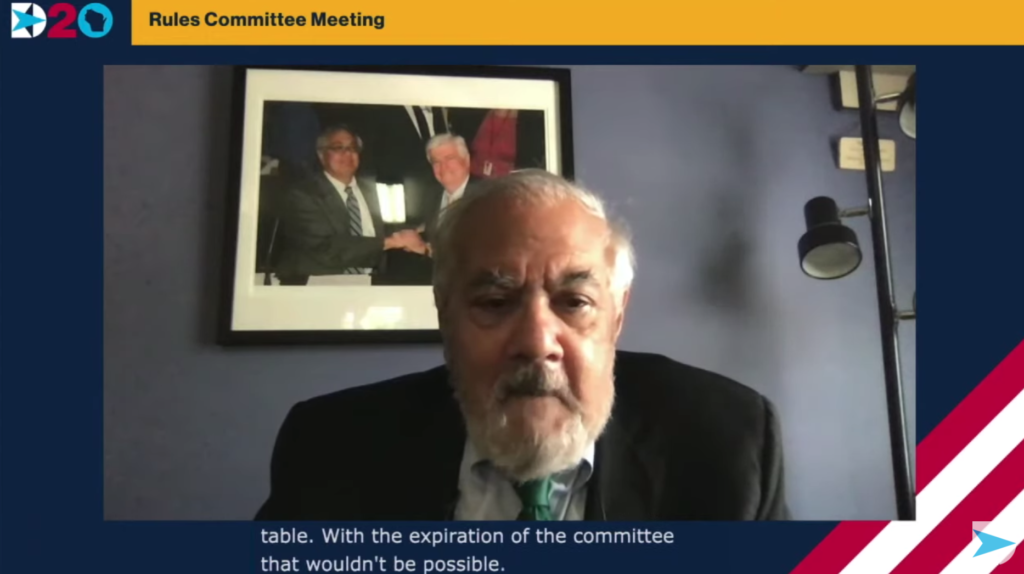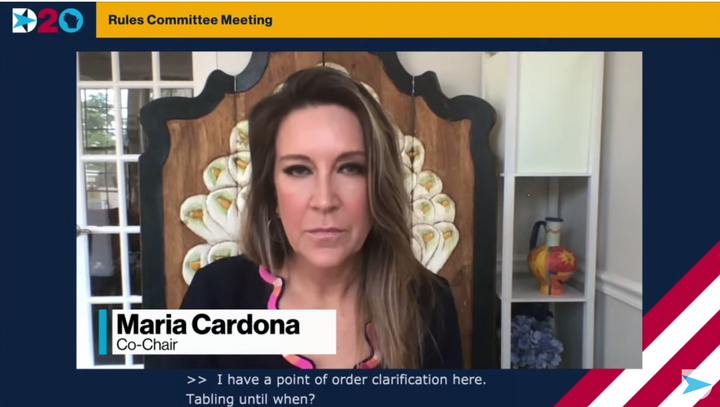Last week, a proposal to reduce corporate influence over the Democratic Party was hastily rejected during a virtual meeting of the Democratic National Convention Rules Committee by a vote of 105 to 45, with eight abstentions. The resolution, which would have changed the DNC Charter to permanently bar corporate PAC donations and ban corporate lobbyists from serving on the party organization, was introduced by Brent Welder, a Kansas City area attorney and delegate appointed by the Bernie Sanders campaign.
Several of the Rules Committee appointees who voted against Welder’s resolution have backgrounds in corporate lobbying. Sludge found at least ten current corporate lobbyists and one major former lobbyist—as well as three corporate consultants, four corporate lawyers, and five corporate executives—among the members who voted against the proposal.
“If you are a lobbyist for a for-profit corporation, you shouldn’t serve on the DNC,” Welder told Sludge. “I guarantee you that 99.9% of Democrats in America agree with that, and only the place you find people who disagree with it are in the leadership of DNC.”
The Convention Rules Committee’s virtual meeting was co-chaired by former Rep. Barney Frank, who serves on the board of directors of New York commercial bank Signature Bank, and Maria Cardona, a principal at Dewey Square Group, a lobbying and public relations firm that worked for the insurance industry during the debate over health care reform early in the Obama presidency.
Welder, who also proposed a resolution on ranked-choice voting, said that he was approached by the Biden campaign through an intermediary and pressured to withdraw his measures.
“I was informed before the meeting that of all the amendments put forth, the Biden campaign was most upset about those two amendments, and urged me to withdraw them, which I politely declined to do,” Welder said. “There had been about 30 amendments originally proposed, the deadline was a few days before. By time the meeting happened, it was down to eight, as people had been pressured to withdraw amendment through various means. Of all the amendments, they tried to kill them without anyone knowing who voted for or against them.”
About two hours into the virtual meeting, which is viewable on YouTube, Welder was recognized for several minutes in the main room to speak on behalf of his resolution. “We need to neutralize the corporate influence, first within our party, that is preventing us from living up to the platform, our ideals, and being a true party of the people,” Welder said.
After Welder’s remarks, co-chair Maria Cardona opened the debate and said that members could begin voting on the proposal immediately through the portal. Cardona then turned the floor over to Illinois lobbyist Mike Kreloff, who read prepared remarks explaining that as a lobbyist who sometimes worked for corporations he thought a separate DNC commission, which he said has been running for 18 months, should be the venue for evaluating the resolutions. Jerry Goldfeder, a Biden appointee and a New York election lawyer, echoed Kreloff’s remarks and succinctly moved to table the resolution. Andrew Tuozzolo, chief of staff to New Orleans City Councilwoman Helena Moreno, immediately seconded the motion in the main speaking room, and Cardona initiated a new vote to table Welders’ resolution.
Welder then asked Frank for how long the resolution would be tabled and Frank replied that it would be tabled “until someone makes a successful motion to take it off the table,” adding that “with the expiration of the committee that wouldn’t be possible.” Welder replied, “Gotcha, that doesn’t make any sense at all.” The vote to table Welder’s resolution was then announced as 122-46.

At that point, Welder told Sludge, “The co-chairs shoved [my video call] back into the side room, where I couldn’t be heard.” Welder said that he believes his microphone had initially been left on inadvertently by the meeting co-chairs. “With other members there, protests sustained for 10-15 minutes, until the chairs first said the meeting was adjourned, but then said there would be an up or down vote on the proposal. Bernie campaign leadership had convinced them to untable it,” through an off-camera process, Welder said. Minutes before the long meeting ended, the final vote against Welder’s resolution among the committee of mostly Biden campaign appointees came in at almost two-to-one against.
While he decried the process for considering the resolution as flawed by design, Welder describes being able to raise his amendment as a “big step forward in transparency, to hold the DNC accountable for corruption that’s occurring.”
“Getting Big Money out of politics makes everything else possible,” Welder said. “A lot of people don’t realize the corruption that happens at the top ranks of the DNC, that rank and file Democrats have lots of good ideas that get railroaded by leadership.”
Sludge sought to confirm Welder’s account with DNC Communications Director Xochitl Hinojosa, a top Perez adviser going back to his stint as secretary of Labor, and DNC Secretary Jason Rae, but did not receive a response.
Below are some of the committee members with backgrounds in advancing corporate interests who voted against Welder’s resolution.
Corporate Lobbyists on Convention Rules
Maria Cardona, an at-large DNC member, is a principal at lobbying firm Dewey Square Group, whose past lobbying clients include AT&T (on “telecom liability issues”), multiple medical companies, and Countrywide financial corporation, the implosion of which triggered the subprime mortgage crisis. In 2016, The Intercept reported that consultants with Dewey Square Group lobbied against Obamacare and the Dodd-Frank financial reform package. In advocacy efforts for insurance industry clients such as the Massachusetts Association of Health Plans, Dewey Square Group placed letters to the editor in newspapers “under names of elderly Massachusetts residents without their knowledge or consent.”
Committee co-chair Barney Frank, who had received over $1 million in payments from Signature Bank as of May 2018 when he agreed that the Trump administration’s deregulation of banks did not pose a major threat, did not appear to vote on Welder’s resolution, as no roll call vote was recorded for him.
Harold Ickes, an at-large DNC member, is a powerful lobbyist and party insider whose past clients have included Deloitte Consulting, Verizon, Northwell Health, JP Morgan Chase, Mastercard, and United Airlines. Ickes was appointed to the regular rules committee by Chair Tom Perez in an October 2017 “purge” of DNC leaders who had favored greater reforms for party transparency or backed Perez’s rival Rep. Keith Ellison for chair.

